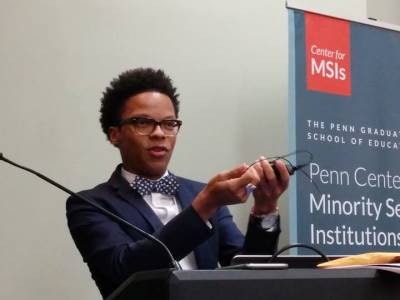 Dr. Terrell Strayhorn, a professor of education at The Ohio State University , said that the convening “brought about honest discussion and spirited debate.”
Dr. Terrell Strayhorn, a professor of education at The Ohio State University , said that the convening “brought about honest discussion and spirited debate.”PRINCETON ― When it comes to the best return on investment regarding a college education, minority-serving institutions (MSIs) across the United States continue to lead the way.
That was the sentiment among dozens of MSI college presidents, professors, alumni and advocates who gathered recently at the Educational Testing Service (ETS) for a two-day conference that affirmed MSI’s current role within the higher education landscape.
The National Minority Serving Institutions Return on Investment (ROI) Convening, sponsored by ETS and the Center for Minority Serving Institutions at the University of Pennsylvania, highlighted the ROI for MSIs, who serve minority populations that are often first-generation college students or hail from low-income backgrounds.
The convening included four commissioned, empirically based ROI-focused papers focused on historically Black colleges and universities, tribal colleges and universities, Hispanic-serving institutions, and Asian American and Pacific Islander-serving institutions, also known as ANNAPISI. The papers were written by leading education scholars such as Dr. Terrell L. Strayhorn of The Ohio State University and Dr. Stella M. Flores of New York University.
In addition, the convening included four short Impact talks aimed at helping attendees to think differently and expansively about the meaning of ROI, says Dr. Marybeth Gasman, director of Penn’s Center for Minority Serving Institutions and a full professor in the university’s Graduate School of Education.
“I was very pleased with the diversity of different types of research presented,” said Gasman, who added that a report based on the ideas from the convening will be circulated. “It showed the variety of different techniques that we need to use to understand return on investment and the power of those techniques.”
Gasman said that a ROI campaign focused on MSIs will likely help to change perspectives about the value of minority-serving institutions.
“As MSIs continue their ascendance and even expand their share of enrolled postsecondary students, they will also be expected to produce increasing amounts of high-quality data and information on institutional effectiveness to secure a greater share of resources to support their growth and to show that they are continuously improving student outcomes,” said Dr. Michael T. Nettles, senior vice president of the Policy Evaluation and Research Center at ETS. “With ever-increasing competition for limited resources, many MSIs are confronting such questions as whether to raise admission requirements to manage growth and help elevate students’ persistence and graduation rates and student performance on outcomes assessment; improve the quality of their teacher preparation programs; and reduce the default rates on student loans. Included among the data and information that they are increasingly being called upon to produce is evidence about their graduates’ learning, preparation for the workforce, attractiveness to employers and successful pursuit of postbaccalaureate degrees.”
Nettles said that increasing the amount and quality of data and information about the value and contribution of America’s 649 MSIs to the national economy and social landscape “can strengthen their case for greater resources.”
In his paper, Strayhorn, who directs the Center for Higher Education Enterprise at Ohio State, sought to measure the ROI for HBCU graduates in terms of annual earnings, occupational status, job satisfaction and racial/ethnic identity.
In an interview with Diverse, Strayhorn said that the convening “brought about honest discussion and spirited debate that I think is rare sometimes in higher ed but certainly needed,” he said. “We talked about everything from the quality and availability of data sets, to race and racism and how it shifts returns on investments as well as who the investors are and what we are willing to pay for higher education.”
Paola “Lola” Esmieu, assistant director for programming at Penn’s Center for Minority Serving Institutions, said that it was important to bring together various stakeholders to a national gathering. Those stakeholders included Neil Horikoshi, president and executive director of the Asian & Pacific Islander American Scholarship Fund, Dr. Chery Crazy Bull, president and chief executive officer of the American Indian College Fund, and Lezli Baskerville, president and chief executive officer of the National Association for Equal Opportunity in Higher Education.
“I think we know there is an ROI when it comes to MSIs,” said Esmieu. “I think my biggest hope is that we leave with a better understanding of how we can communicate that ROI to the general public, with other institutions and with students so that people will understand and be willing to further invest in these MSIs.”
Jamal Eric Watson can be reached at [email protected]. You can follow him on Twitter @jamalericwatson.


















